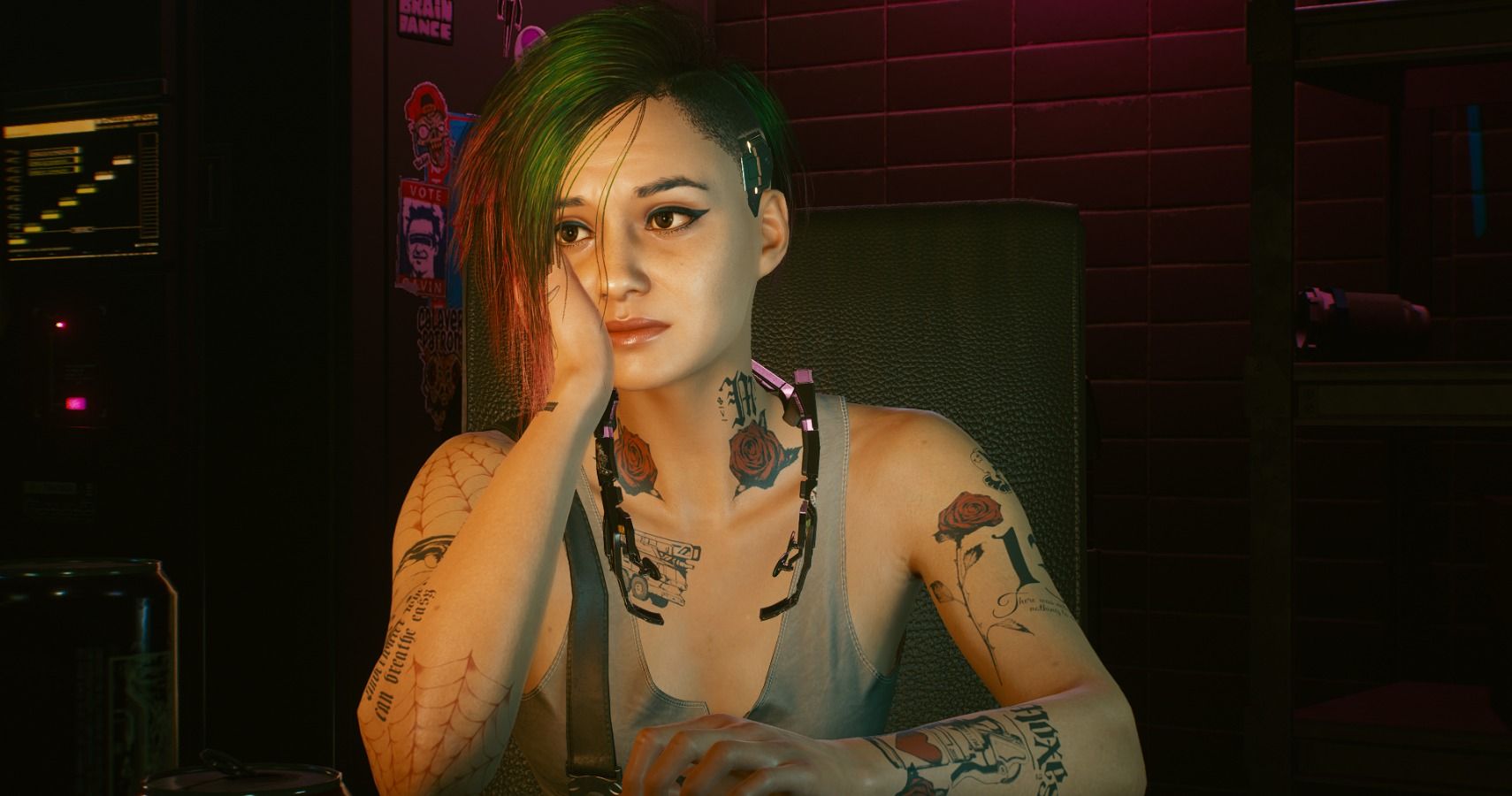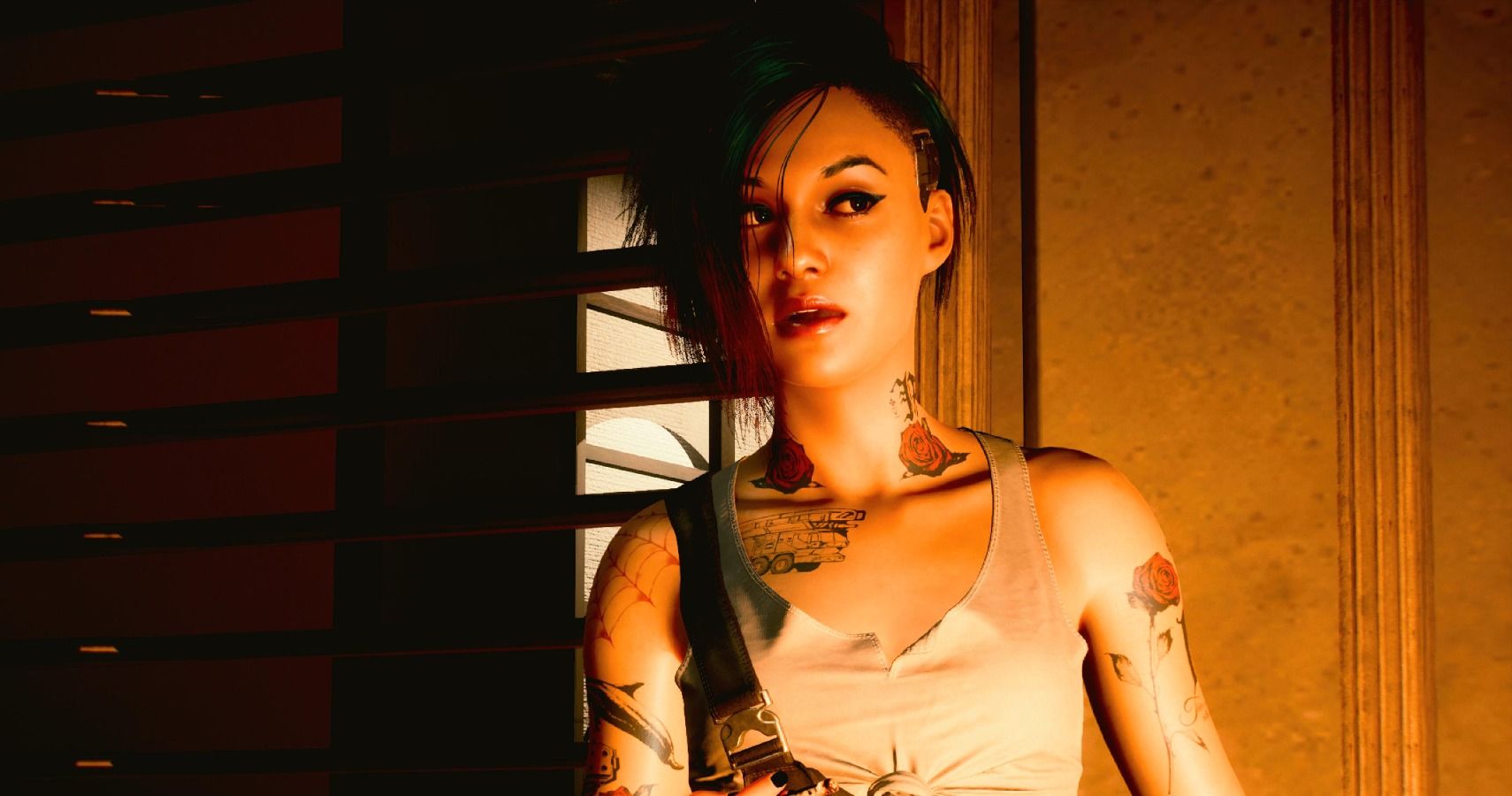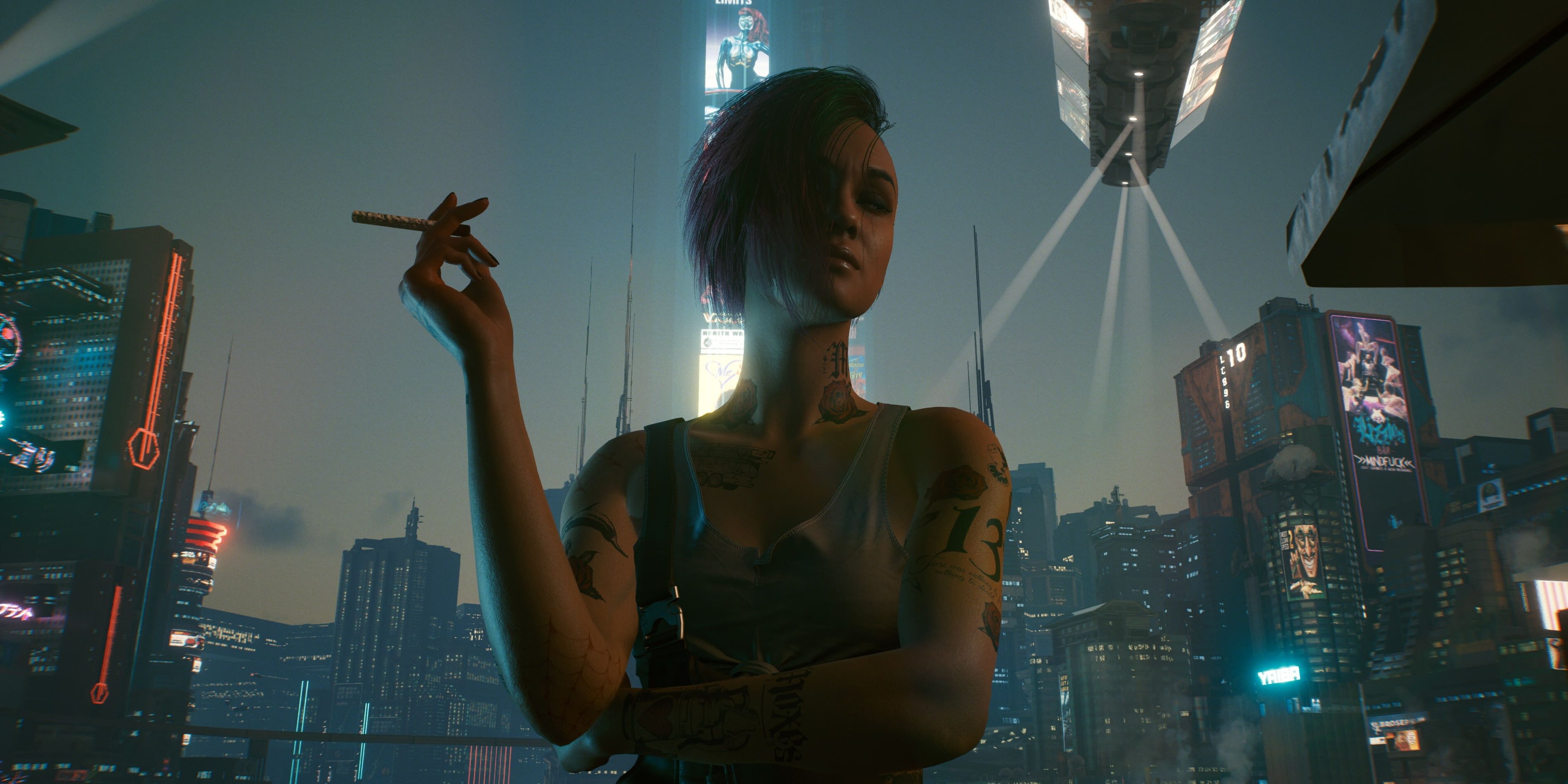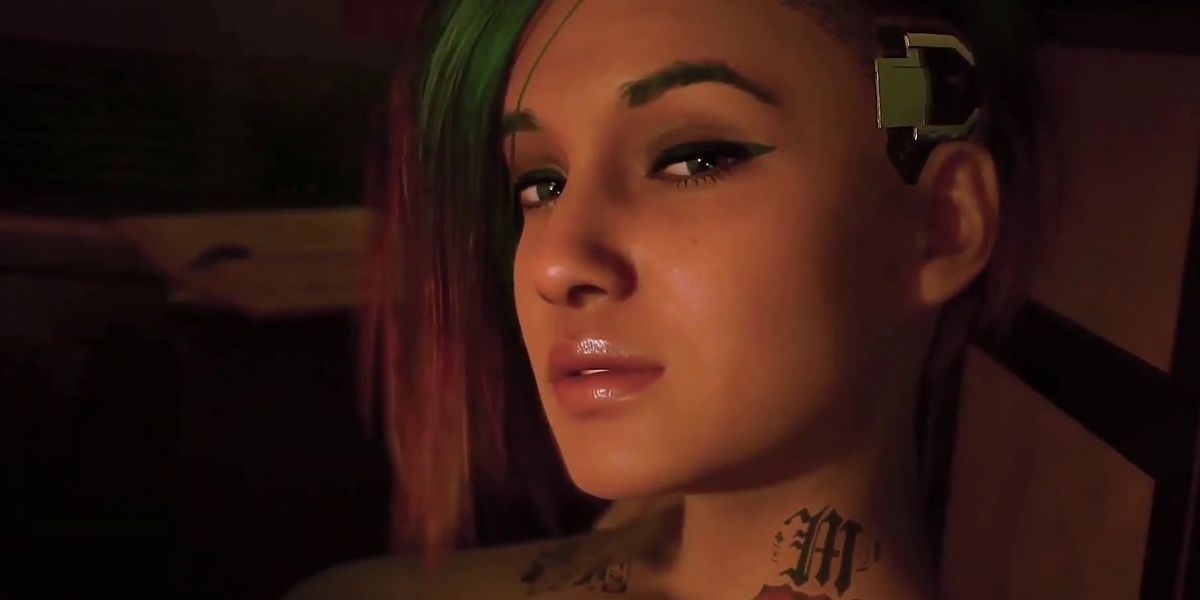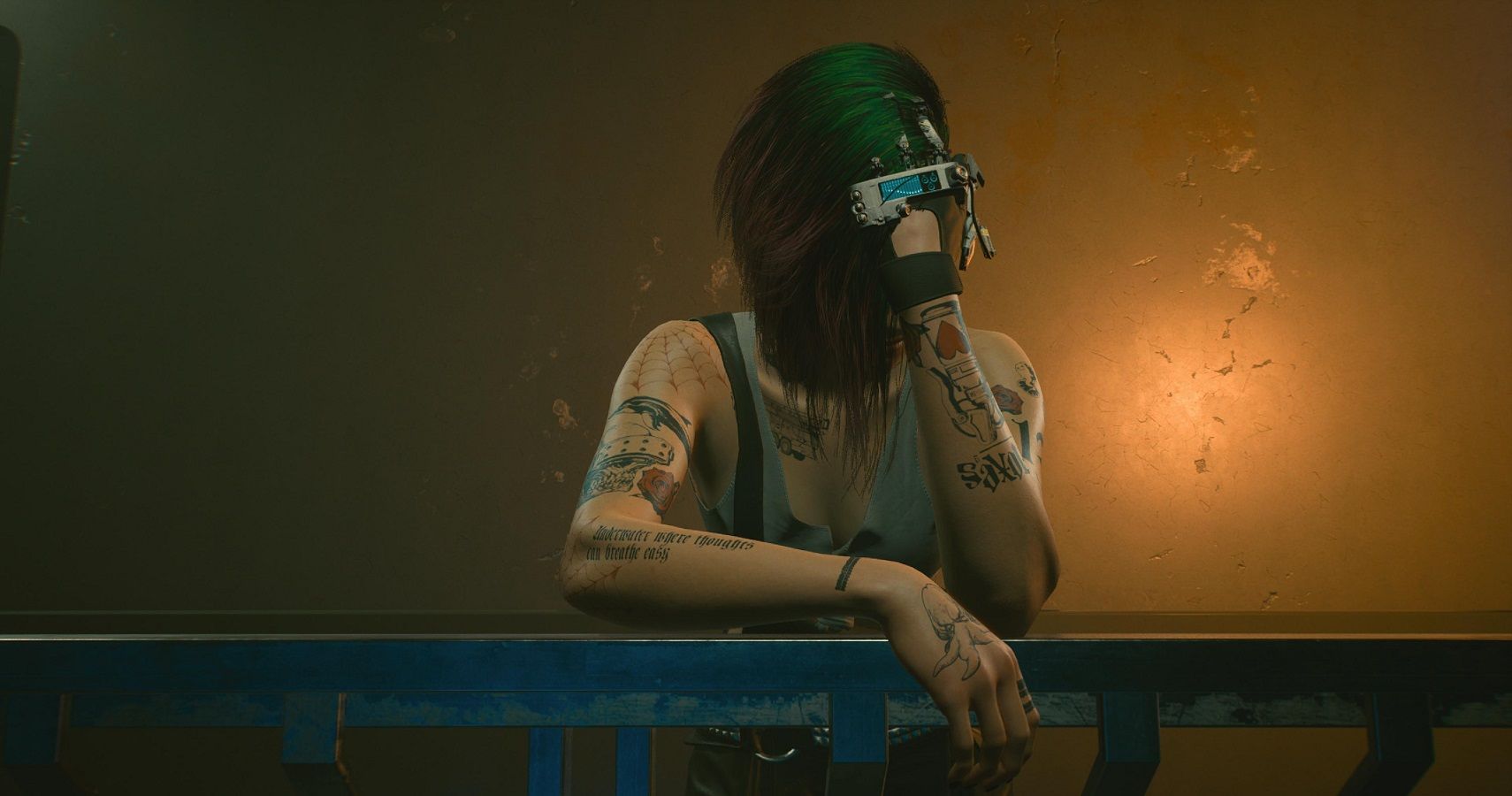“There were some dark scenes to navigate,” Carla Tassara tells me while reminiscing about the audition process for Cyberpunk 2077’s Judy Alvarez. “Details of projects are often unclear in the beginning, so I asked my agent more about this Judy character and, ahem, we were both under the impression that Judy was a codename for Sasquatch. I had auditioned for that role as well and I’d seen images of her - I was stoked!”
If you’re unfamiliar with Sasquatch, she’s a towering boss enemy found in the Pacifica shopping centre. Showcased as part of an early press demo, the character turned out to play a relatively minor role in the game, whereas Judy Alvarez - the character Tassara was actually auditioning for - is a far more prominent figure in the world of Cyberpunk 2077. Many consider her the most human character in the dystopian realm of Night City, acting as a bastion of hope for players to cling onto throughout the main narrative.
In a game often maligned for its inconsistent tone and representation, Judy was a welcome bright spot and easily my personal favourite aspect of the narrative experience. In our interview, Tassara talks about Judy’s origins, her performance, and how games can go about tackling representation and mental health in the years to come.
Thankfully, the Sasquatch thing was cleared up pretty quickly: “I sat down in the control room to discuss ‘Judy,’” Tassara says. “The director started telling me that Judy was obviously on the younger side, and not necessarily a nerd, but very smart and she would be guiding the player through much of the technology... not an introvert but fairly chill. At this point I raised my hand and said ‘Um, I have a question.’ Aaaand he proceeded to tell me that Judy was definitely not Sasquatch. So I laughed and switched gears. Ok, now I’m a techie. Awesome.” Tassra says, noting that the pressure subsided once the roll became hers, and she finally sunk into months of recording sessions that would go on to define Judy Alvarez.
CDPR also gave Tassara ample freedom to explore the role, defining many of Judy’s characteristics and mannerisms herself when recording scenes and dialogue. “CDPR had such a clear grasp of the design and the feelings they wanted to convey,” she explains. “This and the brilliant direction gave me the freedom to play her with a level of intimacy that I’d always wanted to try in a game. The writing was unpredictable and a gift to discover, even the tougher moments. I felt challenged, excited, and I spent the whole time hoping I was doing justice to this fascinating human whose passion, fierce friendship, and intelligence I really dig.”
Judy is a character defined by her honesty. When first meeting her, the player is greeted with a tough personality that isn’t willing to open up. But as you experience trauma alongside her, Judy confides in V, learning to accept her own vulnerabilities and accept that it’s okay both to trust in someone and offer the same level of intimacy in return. Tassara let this honesty in dealing with trauma bleed through her performance, noting that games shouldn’t be afraid to tackle issues like this in such a direct way.
“As actors, we are in the business of experiencing and feeling those lows and highs in life that people are often not permitted to openly process and discuss,” Tassara explains. “By honoring those moments authentically, we give the audience permission to feel what may not be safe for them to feel in the real world. Interestingly, I think it’s what Judy’s trying to do with her braindance work in the game, isn’t it?”
Judy’s final quest - Pyramid Song - is awash with emotional vulnerability, providing us with a window into this character’s past that has never been shared with anyone before. “Consider people’s response to Pyramid Song,” Tassara says. “The very BD technology that in Night City is used for not-so-healthy thrills (and investigative tools), Judy is also creatively harnessing in order to find human connection by inviting others on a journey into her intimate past. That’s empathy. I think it moved people in valuable ways. Virtual experiences of deeply shared emotion can be not just an escape but a path inward to healing, in the Cyberpunk world and in ours.”
Cyberpunk 2077 might fumble with some of its more delicate themes and storytelling, but when its characters are placed in positions to bear everything to you, it feels genuinely heartwarming. Night City still threatens to swallow us whole, but there are splinters of light amidst the neverending darkness. As for games that tackle such aspects of mental health, Tassara is all for it. “It’s important for games to cover mental health, authentically and responsibly,” she says. “Video games have tremendous reach with so many people, I dare say even more so than movies. I know gamers who find connection through games that they find nowhere else. Gamers wrote to me on the topic of suicide, something prevalent in Judy’s life. They even spoke of how they would think twice about it after seeing the pain it caused Judy to see her loved ones take their lives. It took such courage for them to reach out about that. Even one person responding to the game in that way makes it infinitely important.”
Judy Alvarez is also a bright spot for representation in a game that struggles in depicting a number of diverse groups. As a Latina herself, Tassara immediately connected with that aspect of Judy’s character, seeing her own experiences in the futuristic braindance technician. “I am Latina,” Tassara says. “I resonate with the broader Latin culture more than I do any other. It’s home to me. Roles representing Latinos are ever increasing, and with that I hope will come more and more nuanced and individuated characters such as Judy.”
Judy is also an openly gay character, her romance path only being open to those who decide to play V with a female body and a female voice in 2077. It’s a refreshing change of pace for games like this, where the reward at the end of such romantic pursuits is often a brief sex scene regardless of your gender. The binary nature of Cyberpunk’s character creator holds it back from true greatness, but it remains a good step forward. Here, it means something, and Judy’s integrity isn’t thrown away just so the player can feel the slightest bit of titillation. “I am proud to have portrayed a gay woman in what I think, should the player choose so, is a complex romantic relationship, and in the friendships in which she makes no apologies for being exactly who she is,” Tassara explains. “I’ve received messages from gamers [especially] queer women who saw themselves in her and felt seen and inspired. Representation in storytelling is vital and I credit the writers for Judy’s impact. I’m thankful for it.”
Tassara’s description of voicing Judy’s more intimate scenes is downright adorable, showcasing the vulnerability performers expose themselves to in roles like this. “I only knew Judy was gay just before we recorded any romantic interactions (or rejections),” Tassara says. “I felt so lucky to live out those moments, giddy, heart-naked, and I even asked our director and the engineer to look away when I recorded them, it felt that exquisitely vulnerable. Again, she’s just beautifully written.” I continue to see fresh perspectives and fan creations of Judy Alvarez across the internet months after release, her presence outlasting that of even Keanu Reeves’ Johnny Silverhand. I feel part of this success is due to Tassara’s performance, which is likely why it landed her a BAFTA nomination earlier this year.
While she didn’t win, the sheer recognition was more than enough, “I felt ecstatic, giddy, nervous, and above all grateful,” she tells me. “I absolutely did not expect it. It felt like I was in that movie The Truman Show and people were writing crazy things on the internet and seeing how I’d react. I’ll be honest, I have always wanted a BAFTA nomination. It’s a true honor, a meaningful nod from my industry colleagues for which I am utterly grateful.”
Before our chat wraps up, I ask Tassara if she would ever step into the shoes of Judy Alvarez again, and the answer was a resounding yes. “Judy rocks, so if I ever get an opportunity to voice her again, I’m on board,” Tassara says. “I want more. Of her and of characters like her. She felt embodied, a fully fleshed out, psychologically complex being.” Once the course has been fully corrected at CD Projekt Red, perhaps such a return will be possible - I’ll definitely be keeping my fingers crossed.

